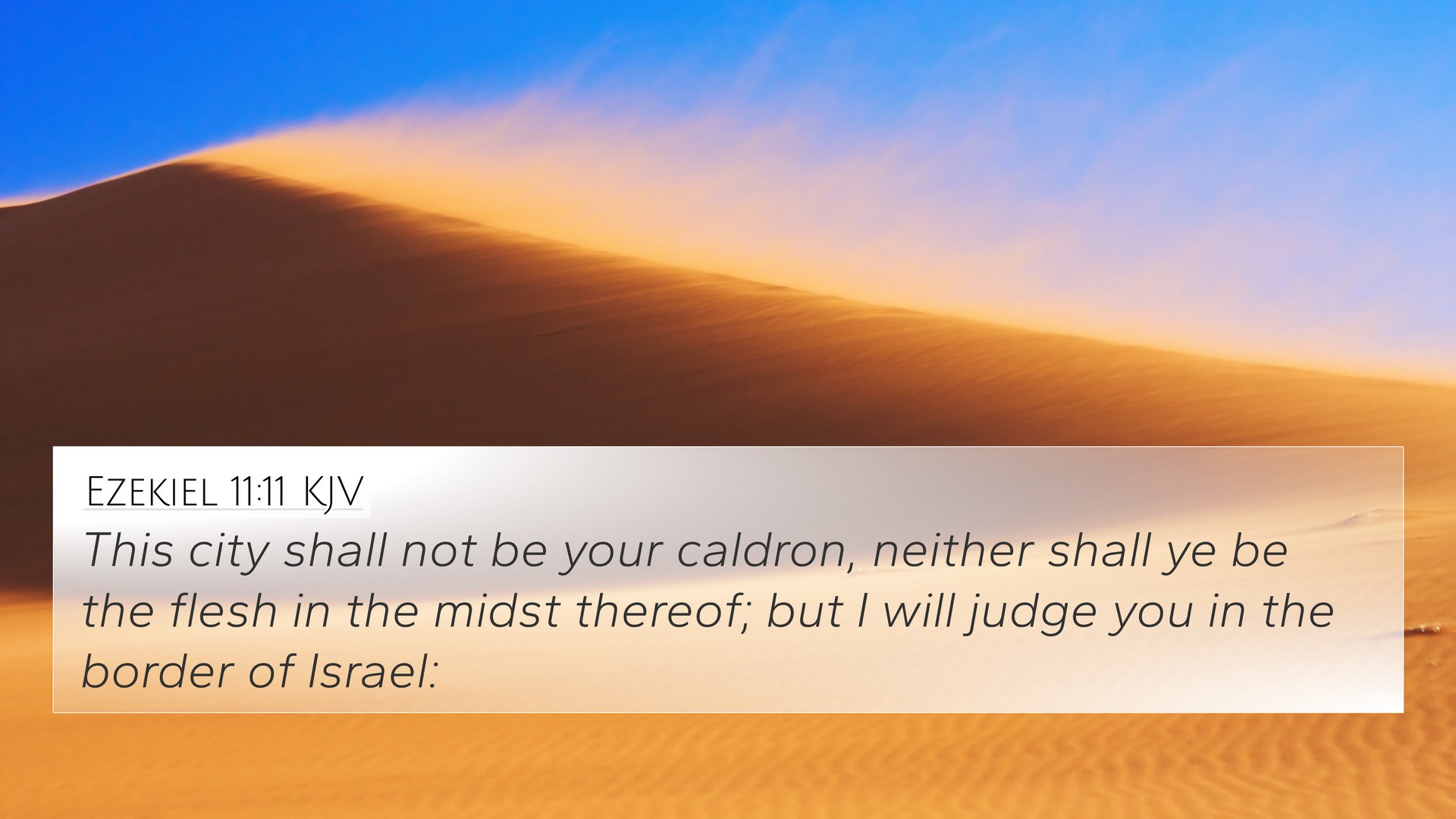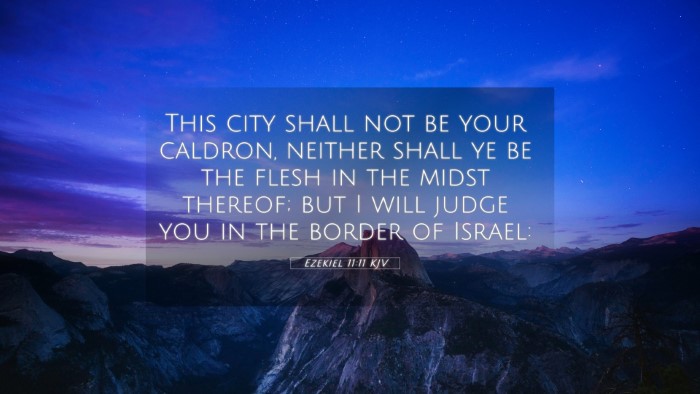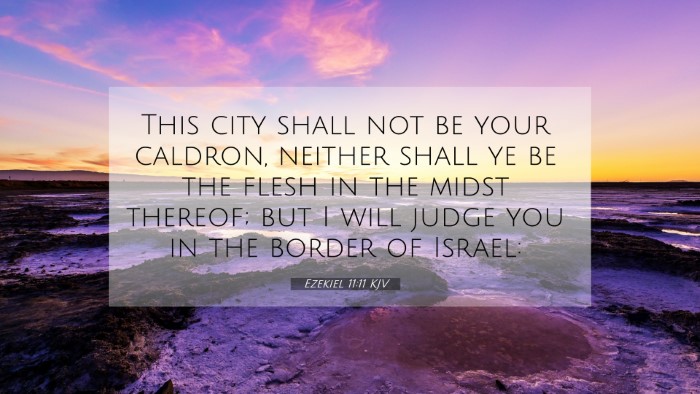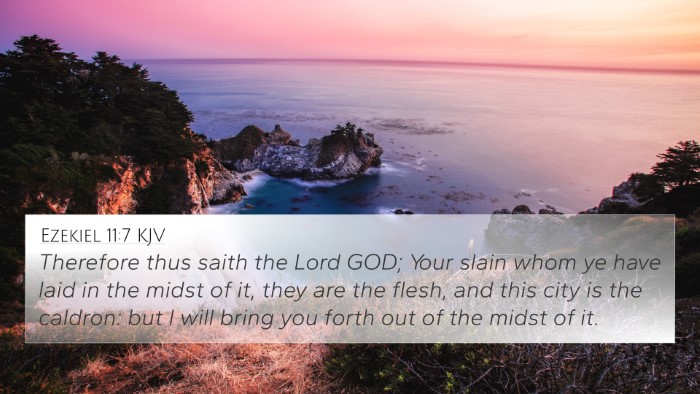Ezekiel 11:11 - Summary and Interpretation
Bible Verse: Ezekiel 11:11
Verse Text: "This city shall not be your cauldron, neither shall ye be the flesh in the midst thereof; but I will judge you in the border of Israel."
Meaning and Summary
This verse reflects God's promise of judgment and protection for His people. Through the prophet Ezekiel, God communicates that Jerusalem, often depicted as a "cauldron" for its inhabitants, will not serve as a place of refuge for those who are unfaithful. Instead, they will face judgment outside the city.
Key Themes
- Judgment: God's judgment is both imminent and impartial, targeting those who forsake Him.
- Protection: God assures faithful individuals that they will not be consumed by the judgment that falls upon the city.
- Divine Authority: This passage emphasizes God's sovereignty over the fate of the people.
Insights from Public Domain Commentaries
Matthew Henry: Henry posits that the cauldron symbolizes the security that the inhabitants of Jerusalem falsely believed they had. He notes that God will separate the faithful from the unfaithful, showing His authority to judge the wicked while preserving the righteous.
Albert Barnes: Barnes indicates that Jerusalem's role as a cauldron signifies a sense of comfort and safety that would soon be shattered. He emphasizes the correlation between the coming judgment and the people's moral decay, suggesting that true safety cannot be found in disobedience to God.
Adam Clarke: Clarke interprets the cauldron as a metaphor for the city’s impending destruction. He elaborates on the implications of judgment from the border of Israel, implying a strict divine decree that extends beyond national boundaries and into individual lives.
Bible Verse Cross References
- Ezekiel 11:7: "Therefore thus saith the Lord GOD; Ye have killed the people that are in this city..."
- Jeremiah 29:17: "Thus saith the LORD of hosts; Behold, I send upon them the sword, the famine, and the pestilence..."
- Ezekiel 9:2: "And, behold, six men came from the way of the higher gate..."
- Isaiah 1:27: "Zion shall be redeemed with judgment..."
- Daniel 9:16: "O Lord, according to all thy righteousness, I beseech thee, let thine anger and thy fury be turned away..."
- Lamentations 2:9: "Her gates are sunk into the ground..."
- Matthew 23:37: "O Jerusalem, Jerusalem, thou that killest the prophets..."
Connections Between Bible Verses
This verse creates thematic links to other passages throughout the Bible, aiding meaningful insights through comparative Bible verse analysis. Here are some notable connections:
- Thematic Development: Both Ezekiel and Jeremiah discuss the fate of Jerusalem and its people, illustrating a prophetic warning of impending judgement.
- Cross-referenced Themes: Similar notions of divine judgment can be found in the Psalms and the New Testament, such as Matthew 23:37, where Jesus laments over Jerusalem's fate.
- Inter-Biblical Dialogue: The judgments proclaimed in Ezekiel resonate with themes discussed in prophetic literature and apocalyptic texts.
Understanding Scripture Through Cross-Referencing
By engaging with tools for Bible cross-referencing, readers can delve deeper into Ezekiel 11:11, enrich their understanding, and identify connections across both the Old and New Testament. This enhances the reader's grasp of the broader Biblical narrative.
For instance, exploring Jeremiah's prophecies alongside Ezekiel's from a cross-reference Bible study perspective highlights the recurring themes of judgment and redemption.
How to Use Bible Cross-References
Finding cross-references in the Bible involves examining similar themes, keywords, or phrases across different scriptures. Utilizing a Bible concordance or a Bible cross-reference guide can enhance this process. One might explore the idea of judgment in various books to see the connectedness of Biblical truths.
Conclusion
The verse Ezekiel 11:11 serves not only as a warning but also as an assurance from God regarding His ultimate plan for His people. The insights gleaned from public domain commentaries provide depth to the understanding of this verse, while cross-referencing other scriptures supports a broader interpretation of its significance within the entirety of Biblical theology.




